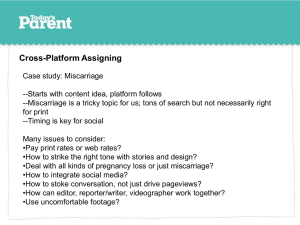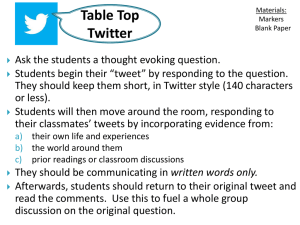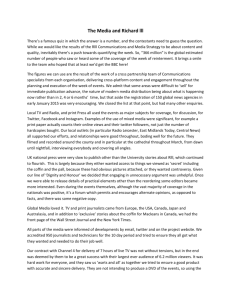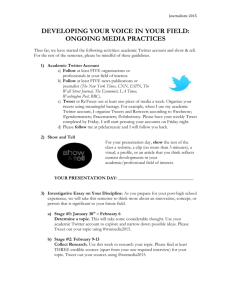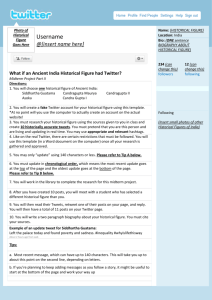New York Times - Career Account Web Pages
advertisement
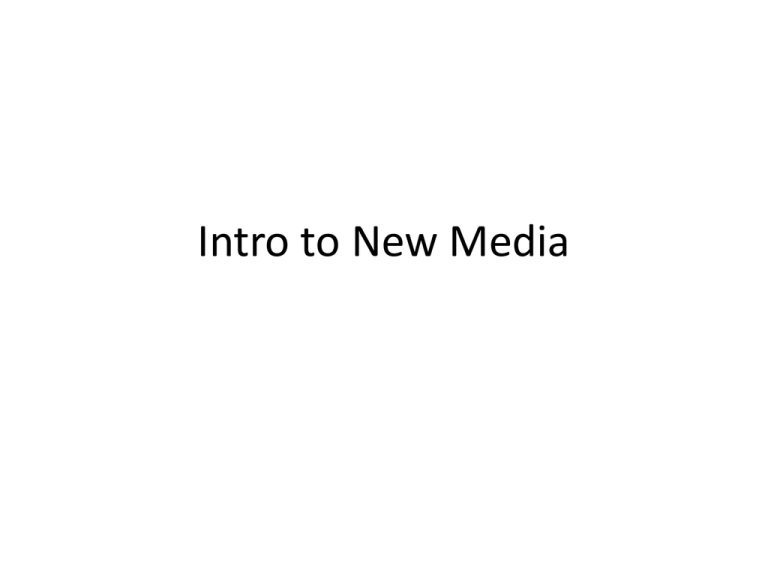
Intro to New Media Newspapers moving slowly The Audit Bureau showed that average weekday circulation at 635 newspapers declined 5 percent from April-September 2010 compared with the same six months last year. The decline last year was more than twice that, 10.6 percent. Reinventing the wheel How are we getting news today? Digital delivery is now well established as a part of most Americans daily news consumption. Six in 10 Americans get some news online in a typical day—and most of these also get news from other media platforms as well. From the State of the Media, 2010, Pew Project Excellence in Journalism Many publications, including former print publications, are now online only. Online only : the Seattle PI and The Daily Beast The past couple of years proved important for social media establishing themselves as a part of the media ecosystem. The power here had less to do with reporting than serving as a place for people to quickly come together around an issue that they feel passionately about to share concerns, pass along information, offer financial contributions and in several cases bring about change. Think Osama Bin Laden, Haiti earthquake, Egypt, Ghadafi, Occupy Wall Street. From: Media Scrambles “And news organizations that broke the momentous news first over Twitter, like the New York Times in a tweet by reporter Jeff Zeleny, quickly shifted to an online piece while re-imagining a print edition for posterity. The Times had to rip up Monday’s front page to accommodate a six-column headline that did the huge story justice. But hours before the Times or other newspapers hit the streets Monday, the news filtered out over a variety of media platforms. On Facebook, users described where they first heard the bin Laden news, citing Twitter, major broadcast and cable networks or via their iPhones. NBC anchor Brian Williams, speaking over a live shot of a euphoric, spontaneous gathering in front of the White House, noted that “social media and everyone’s electronic device broke the word, at about the same time, across this country.” Consumers meanwhile, are quickly moving on to even newer forms of communication. Blogging is declining in frequency while 26% of Americans now get news on their cell phones, and half of online news consumers with social networking sites use those pages for news. One thing that is becoming clearer is the way people use digital technology to acquire news. The American news consumer is increasingly becoming a grazer, across both online and offline platforms. On a typical day, nearly half of Americans now get news from four to six different platforms—from online to TV to print and more, according to new research from PEJ and the Pew Internet and American Life Project. What are we talking about? • In 2009, PEJ launched a new weekly analysis of the top news stories discussed and linked to on blogs and social media. • The stories and issues that draw the most attention in blogs and on Twitter differ substantially from the mainstream press. In the 47 weeks studied during 2009, blogs and the mainstream press shared the top story just 13 times. And in Twitter only 4 times. • Among the two social media platforms, Twitter users strayed the farthest from the mainstream press. Blogs were a bit more traditional, at least in the sources they drew on. On both platforms, though, one clear characteristic was the ability of new media to quickly trigger and concentrate passionate debate and activity around a specific issue • Blogs often filled the role adding analysis or debate when highlighting these stories. Following the shootings at Fort Hood, for instance, bloggers linked to straight news accounts, with some then expressing condolences to the families of the victims, while others quickly pivoted to discuss the role that the suspect’s religion may have played. • The vast majority of Tweets were not opinionated or analytical at all, and this went beyond the fact that Twitter is limited to 140 characters. Most of the Twitter posts were designed to alert people to something interesting, to pass along information. Of those Twitter feeds that contained news links, the vast majority tended to simply repeat the headline from a website. How are businesses using social media? The Global Social Media Check-up 2010, some interesting facts. And locally, how are businesses using social media? How success is measured now: Social influence marketing scores “Use it to engage your customers in a conversation, not just sell your services.” Source “A good portion of my tweets are conversational just to stay in front of my followers as much as possible. However, I also use it gauge interest about new products, run specials, and get the word out about events,” Joe Woelfe, small business owner. • Citizen journalism continued to play a role as well. Here, new research added to the sense that citizen media at this point still are not in a position to replace or provide the same type of coverage as traditional outlets. They just don’t have the resources to do so. New research conducted by a team of academics finds that some top citizen news sites average less than one new story a day. • Instead, many in that field see a different kind of role – partnering with news, helping to fill in gaps where news outlets no longer go and even joining forces with one another to increase their offerings. • Example In this class we hope to achieve some of the: 8 Must Have Traits of Tomorrow’s Journalists Advice for Journalism Students Now Mobile Journalism Reporting Tools Guide

